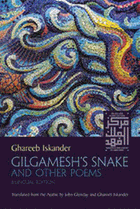
In the ancient Babylonian myth, Gilgamesh, grieving over the loss of his companion, Enkidu, and the realization of his own mortality, sets out to find the only human to become immortal, Utnapishtim (analogous to Noah of the Old Testament).
In Ghareeb Iskander's (A Chariot of Illusion) collection of poems, Gilgamesh's Snake and Other Poems, the poet laments that "long ago you loved the names for things,/ the rules of grammar and/ wordplay./ Today, however,/ Your only choice is to carry on/ so that you may set out for life's second darkness." As with the heroic Gilgamesh, loss and the expectation of future loss have robbed him of the joy of living. These losses include his homeland of Iraq (ancient Uruk to Gilgamesh), his father and his lover. To the poet, the silence he hears and the absence he feels have greater weight than oblivion. Separation is the true evil of death.
As with Gilgamesh, the poet eventually comes to terms with the inevitability of that "second darkness." "What does our poet do?/ He stands upright/ face-to-face with despair/ brimful of dreams./ He doesn't battle like Don Quixote/ and he doesn't love like Qays;/ he doesn't drink wine like Abu Nawas./ He simply/ writes poetry." He finds consolation in his art.
And what art it is: rich with broad allusions to the Old Testament, the Qur'an and ancient Babylonian and Greek myths, while maintaining a direct, sincere style. These are poems one will need to read repeatedly to extract the full richness of the work. This repetition is not a chore, but a pleasure. --Evan M. Anderson, collection development librarian, Kirkendall Public Library, Ankeny, Iowa.

